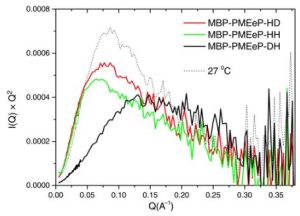Cette partie, en texte seulement, est réservée à l’introduction de votre article. Les 160 premiers caractères seront affichés par les moteurs de recherche.
The conjugation of proteins with polymers offers immense biotechnological potential by creating novel macromolecules. This article presents experimental findings on the structural properties of maltose-binding protein (MBP) conjugated with linear biodegradable polyphosphoester polymers with different molecular weights. We studied isotopic effects on both proteins and polymers. Circular dichroism and fluorescence spectroscopy and small-angle neutron scattering reveal that the conjugation process destabilizes the protein, affecting the secondary more than the tertiary structure, even at room temperature, and that the presence of two domains in the MBP may contribute to its observed instability. Notably, unfolding temperatures differ between native MBP and the conjugates. In particular, this study sheds light on the complex interplay of factors such as the deuteration influencing protein stability and conformational changes in the conjugation processes. The perdeuteration influences the hydrogen bond network and hydrophobic interactions in the case of the MBP protein. The perdeuteration of the protein influences the hydrogen bond network and hydrophobic interactions. This is evident in the decreased thermal stability of deuterated MBP protein, in the conjugate, especially with high-molecular-mass polymers
Daniela Russo, Almerinda Di Venere, Frederik R. Wurm, Martine Moulin, Michael Härtlein, Christopher J. Garvey, José Teixeira


